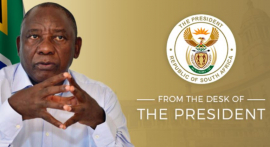
President Cyril Ramaphosa says Black Economic Empowerment remains a pivotal part of government’s economic reconstruction and recovery plan as the country recovers in the wake of the COVID-19 pandemic.
Next year will mark the 20th year that the Broad-Based Black Economic Empowerment (BBBEE) Act was passed.
“Our commitment to entrench and deepen economic empowerment is unwavering. That is why Black economic empowerment is an integral part of our economic reconstruction and recovery in the wake of the COVID-19 pandemic.
“This is one of the reassurances I articulated to the Black Business Council earlier this month, where we discussed the state of BBBEE in the country, the progress that has been made and what we need to do as a collective to build on our gains,” he said in his weekly newsletter on Monday.
This week, President Ramaphosa is expected to announce the new multi-sectoral Broad-Based Black Economic Empowerment Advisory Council which he said is aimed at “championing the cause of economic transformation”.
The President acknowledged that while BBBEE has scored some victories, there has been “regression” in other areas.
“We have gone backwards when it comes to increasing black management control, upscaling skills development, entrenching enterprise development and broadening procurement to give opportunities to black women and the youth,” he said.
Private sector transformation
President Ramaphosa highlighted that in the private sector, not much has improved with white ownership still dominating companies listed on the Johannesburg Stock Exchange.
This, he said, is not reflective of South Africa’s transformation agenda.
“At the end of apartheid, black ownership of JSE-listed companies was less than 1%. This figure has not improved much in the past 28 years. At the same time, there have been important private sector initiatives and deliberate measures by the state to facilitate greater and more meaningful participation of black people in the economy.
“Economic transformation and economic growth are intertwined. There cannot be one without the other. By integrating transformation into the process of industrialisation, we are advancing a more inclusive growth model that shares, rather than concentrates, wealth,” he said.
Government led initiatives to aid the empowerment of black businesses include:
- The Department of Trade, Industry and Competition’s various programmes including a support programme for township businesses, export-related training by the Industrial Development Corporation (IDC) to black, women and youth-owned businesses and increased infrastructure budget to SMMEs in the Tshwane Special Economic Zone.
- Sectoral masterplans to drive localisation that benefits black owned businesses.
- A government backed Black exporters network that will connect black-owned companies in various sectors.
- R2.5 billion in new government support to some 180 Black industrialists in the form of loans from the IDC and National Empowerment Fund (NEF) and grants from the DTIC incentive scheme.
President Ramaphosa said although these initiatives remain imperative, more can be done to counter challenges faced by Black business.
“This includes the difficulty of accessing start-up and expansion capital and the ability of SMMEs to find markets for their products. Black women-owned businesses, in particular, encounter difficulties in taking on large-scale empowerment transactions,” he said.
The President warned that the empowerment of Black people is imperative to economic growth and without it, inequality will continue to reign.
“The continued exclusion of the Black majority from the economy’s mainstream constrains economic growth, which ultimately impacts all business. Expanding the country’s entrepreneurial base is fundamental to growth.
“We have a shared responsibility to drive the effort to entrench BBBEE because it is about eradicating inequality. Unequal economies breed unequal societies, and unequal societies don’t grow and flourish,” he said.
President Ramaphosa said true BBBEE can only be achieved through “partnership and a shared commitment to transformation”.
“Breaking the cycle of underdevelopment through Black economic empowerment is not just a moral imperative; it also makes business sense. It is, after all, the South African public that are the primary consumers of their goods and services. This should be reflected in diversity of hiring and management practices, in ownership and in procurement,” President Ramaphosa said. – SAnews.gov.za


